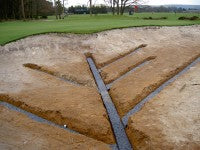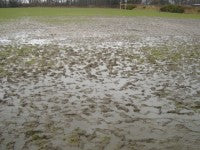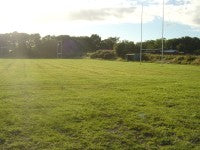Roman links to new drainage product
 A land draining product made from recycled plastics can trace its roots back to Britain's occupation by the Romans.
A land draining product made from recycled plastics can trace its roots back to Britain's occupation by the Romans.
Yorkshire farmer John Gasgarth knew that a patch of land on his farm in North Yorkshire remained perfectly dry, regardless of the weather. Working with researchers from Newcastle University he discovered that the area was being drained by a thorn drain - a system widely used by the Romans all those years ago.
Together, they identified that the Romans had laid blackthorn briars in a trench and, to this day, it removes excess water by a wick and open cavity system, rather like in an oil lamp. The water trickles down along the surfaces of the ancient briars without ever becoming clogged by sand and stones.
"It's quite astonishing how effective it is and that's why I set about designing Aquadyne 11 years ago," says John.
 The product is made from any plastic - from shopping bags and bread trays, flowerpots to silage wrappers and wheelie bins - all different kinds of plastic can be mixed together. Britain produces four million tonnes of industrial, domestic and agricultural waste each year. John now produces Aquadyne by an extrusion process, annually converting tonnes of mixed and plastic waste into a valuable product.
The product is made from any plastic - from shopping bags and bread trays, flowerpots to silage wrappers and wheelie bins - all different kinds of plastic can be mixed together. Britain produces four million tonnes of industrial, domestic and agricultural waste each year. John now produces Aquadyne by an extrusion process, annually converting tonnes of mixed and plastic waste into a valuable product.
The Aquadyne promise, backed by the Newcastle University researchers, is that it can increase drainage capacity against any other process by a minimum of three times and it never clogs. The slabs of product can withstand weight up to 1000 tonnes per square metre. It can be screwed, welded and cut and each square metre will drain up to 20 litres of water per second.
It has a flow rate ten times that of sand, even compression. Its other benefit is that it does not dry out the top soil, which causes cracking during prolonged periods of drought as it retains between 0.5 and 1.5 litres of water per 1000mm x 220mm 45mm panel.
 Head of Marketing, James Arrowsmith, explained: "The other great benefit of Aquadyne is its ease of installation. You don't have to dig deep and wide trenches as you do with conventional drainage systems. It sits just four inches below the ground and needs a trench just 2 inches wide. This does not ruin the surface which is particularly important on golf courses, playing fields and garden lawns."
Head of Marketing, James Arrowsmith, explained: "The other great benefit of Aquadyne is its ease of installation. You don't have to dig deep and wide trenches as you do with conventional drainage systems. It sits just four inches below the ground and needs a trench just 2 inches wide. This does not ruin the surface which is particularly important on golf courses, playing fields and garden lawns."
It has been installed on golf courses, playing fields, farms and National Parks in various parts of the UK, Europe and the USA and the age-old problems of clogging drains has been totally eliminated.
The added appeal of Aquadyne is that it is manufactured from a mixture of 100% recycled plastics and is therefore the greenest option available. A direct saving of 2 tonnes of GHG emissions are made with every 200 metres of Aquadyne used.
Quotes are provided on an individual basis.
For further information and sales enquiries please telephone 01723 586611 or visit www.econoplas.com
